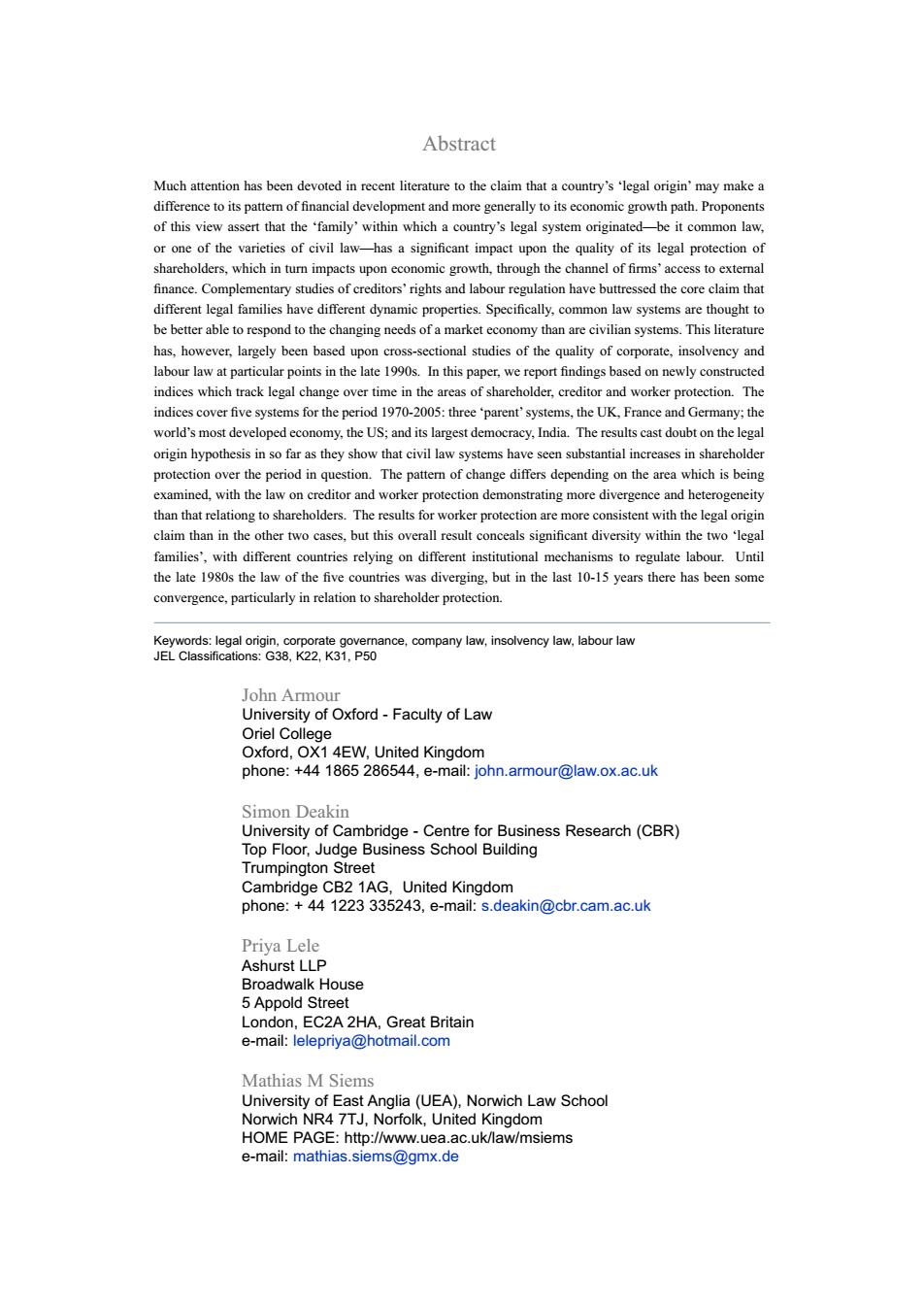正在加载图片...

Abstract Much attention has been devoted in recent literature to the claim that a country's 'legal origin'may make a difference to its pattern of financial development and more generally to its economic growth path.Proponents of this view assert that the 'family'within which a country's legal system originated-be it common law, or one of the varieties of civil law-has a significant impact upon the quality of its legal protection of shareholders,which in turn impacts upon economic growth,through the channel of firms'access to external finance.Complementary studies of creditors'rights and labour regulation have buttressed the core claim that different legal families have different dynamic properties.Specifically,common law systems are thought to be better able to respond to the changing needs of a market economy than are civilian systems.This literature has,however,largely been based upon cross-sectional studies of the quality of corporate,insolvency and labour law at particular points in the late 1990s.In this paper,we report findings based on newly constructed indices which track legal change over time in the areas of shareholder,creditor and worker protection.The indices cover five systems for the period 1970-2005:three'parent'systems,the UK,France and Germany;the world's most developed economy,the US;and its largest democracy,India.The results cast doubt on the legal origin hypothesis in so far as they show that civil law systems have seen substantial increases in shareholder protection over the period in question.The pattern of change differs depending on the area which is being examined,with the law on creditor and worker protection demonstrating more divergence and heterogeneity than that relationg to shareholders.The results for worker protection are more consistent with the legal origin claim than in the other two cases,but this overall result conceals significant diversity within the two 'legal families',with different countries relying on different institutional mechanisms to regulate labour.Until the late 1980s the law of the five countries was diverging,but in the last 10-15 years there has been some convergence,particularly in relation to shareholder protection. Keywords:legal origin,corporate governance,company law,insolvency law,labour law JEL Classifications:G38.K22.K31.P50 John Armour University of Oxford-Faculty of Law Oriel College Oxford,OX1 4EW,United Kingdom phone:+44 1865 286544,e-mail:john.armour@law.ox.ac.uk Simon Deakin University of Cambridge-Centre for Business Research(CBR) Top Floor,Judge Business School Building Trumpington Street Cambridge CB2 1AG,United Kingdom phone:+44 1223 335243,e-mail:s.deakin@cbr.cam.ac.uk Priya Lele Ashurst LLP Broadwalk House 5 Appold Street London,EC2A 2HA,Great Britain e-mail:lelepriya@hotmail.com Mathias M Siems University of East Anglia(UEA),Norwich Law School Norwich NR4 7TJ,Norfolk,United Kingdom HOME PAGE:http://www.uea.ac.uk/law/msiems e-mail:mathias.siems@gmx.deAbstract Much attention has been devoted in recent literature to the claim that a country’s ‘legal origin’ may make a difference to its pattern of fi nancial development and more generally to its economic growth path. Proponents of this view assert that the ‘family’ within which a country’s legal system originated—be it common law, or one of the varieties of civil law—has a signifi cant impact upon the quality of its legal protection of shareholders, which in turn impacts upon economic growth, through the channel of fi rms’ access to external fi nance. Complementary studies of creditors’ rights and labour regulation have buttressed the core claim that different legal families have different dynamic properties. Specifi cally, common law systems are thought to be better able to respond to the changing needs of a market economy than are civilian systems. This literature has, however, largely been based upon cross-sectional studies of the quality of corporate, insolvency and labour law at particular points in the late 1990s. In this paper, we report fi ndings based on newly constructed indices which track legal change over time in the areas of shareholder, creditor and worker protection. The indices cover fi ve systems for the period 1970-2005: three ‘parent’ systems, the UK, France and Germany; the world’s most developed economy, the US; and its largest democracy, India. The results cast doubt on the legal origin hypothesis in so far as they show that civil law systems have seen substantial increases in shareholder protection over the period in question. The pattern of change differs depending on the area which is being examined, with the law on creditor and worker protection demonstrating more divergence and heterogeneity than that relationg to shareholders. The results for worker protection are more consistent with the legal origin claim than in the other two cases, but this overall result conceals signifi cant diversity within the two ‘legal families’, with different countries relying on different institutional mechanisms to regulate labour. Until the late 1980s the law of the fi ve countries was diverging, but in the last 10-15 years there has been some convergence, particularly in relation to shareholder protection. Keywords: legal origin, corporate governance, company law, insolvency law, labour law JEL Classifications: G38, K22, K31, P50 John Armour University of Oxford - Faculty of Law Oriel College Oxford, OX1 4EW, United Kingdom phone: +44 1865 286544, e-mail: john.armour@law.ox.ac.uk Simon Deakin University of Cambridge - Centre for Business Research (CBR) Top Floor, Judge Business School Building Trumpington Street Cambridge CB2 1AG, United Kingdom phone: + 44 1223 335243, e-mail: s.deakin@cbr.cam.ac.uk Priya Lele Ashurst LLP Broadwalk House 5 Appold Street London, EC2A 2HA, Great Britain e-mail: lelepriya@hotmail.com Mathias M Siems University of East Anglia (UEA), Norwich Law School Norwich NR4 7TJ, Norfolk, United Kingdom HOME PAGE: http://www.uea.ac.uk/law/msiems e-mail: mathias.siems@gmx.de